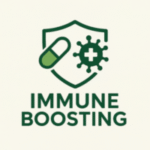In recent years, “immune-boosting” supplements have become one of the fastest-growing segments of the health and wellness market. From vitamin gummies to herbal teas, products promise everything from warding off the common cold to “supercharging” your body’s defences. But how much of this is marketing — and what’s actually backed by science?
The Immune System in Brief
Your immune system is a complex network of cells, tissues, and organs that work together to defend against harmful bacteria, viruses, and other pathogens. It’s influenced by multiple factors, including nutrition, sleep, exercise, stress levels, and underlying health conditions.
While certain nutrients are essential for immune function, there’s no magic pill that can instantly “boost” your immune system beyond its natural capacity. In fact, an overactive immune system can be harmful, leading to allergies or autoimmune diseases. The goal is balance and support — not overdrive.
Popular “Immunity-Boosting” Supplements and the Evidence
1. Vitamin C
- What it does: Supports the production and function of white blood cells, acts as an antioxidant.
- The science: While vitamin C can slightly reduce the duration of colds in some people, it’s not a cure. Daily intake from food or supplements (within safe limits) supports overall immune health.
- Best sources: Citrus fruits, bell peppers, kiwi, strawberries.
2. Vitamin D
- What it does: Regulates immune cell activity and reduces inflammation.
- The science: Low vitamin D levels have been linked to increased susceptibility to infections. Supplementation may help those deficient, especially in winter or in regions with limited sunlight.
- Best sources: Sunlight, fatty fish, fortified dairy products.
3. Zinc
- What it does: Vital for immune cell development and wound healing.
- The science: Zinc lozenges may shorten the duration of colds if taken within 24 hours of symptoms. Long-term high doses can cause side effects and interfere with copper absorption.
- Best sources: Meat, shellfish, beans, nuts.
4. Elderberry
- What it does: Traditionally used for colds and flu.
- The science: Some small studies suggest elderberry extract may reduce flu symptom severity and duration, but evidence is still limited and more rigorous trials are needed.
5. Echinacea
- What it does: Believed to stimulate immune function.
- The science: Research results are mixed. Some studies show a modest benefit in cold prevention, others show little to none. Effects may depend on the specific species and preparation.
6. Probiotics
- What they do: Support gut health, which is closely linked to immune regulation.
- The science: Certain probiotic strains may reduce the risk of respiratory infections, but benefits vary depending on the strain, dosage, and individual health.
Potential Risks of Over-Supplementation
More isn’t always better. Excessive intake of vitamins and minerals can cause:
- Vitamin toxicity (e.g., high doses of vitamin D can lead to calcium buildup and kidney problems).
- Nutrient imbalances (e.g., too much zinc reduces copper absorption).
- Interactions with medications (e.g., echinacea can interact with immunosuppressants).
Always check supplement labels, follow recommended dosages, and consult a healthcare provider if you have chronic conditions or take medications.
Lifestyle First, Supplements Second
While supplements can fill nutritional gaps, they work best alongside healthy lifestyle habits:
- Balanced diet rich in fruits, vegetables, lean protein, and whole grains.
- Adequate sleep (7–9 hours per night).
- Regular physical activity.
- Stress management through mindfulness, hobbies, or relaxation techniques.
Key Takeaways
- Supplements can support immune health, especially if you have deficiencies — but they aren’t a replacement for a healthy lifestyle.
- Evidence varies widely between different supplements; some claims are better supported than others.
- Safety matters: dosage, quality, and interactions should always be considered.
